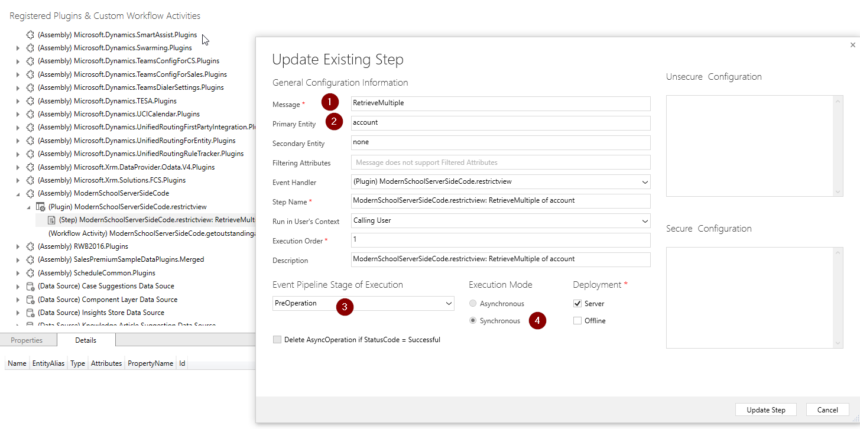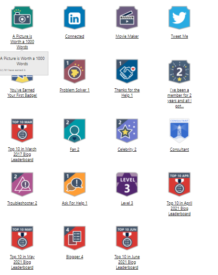RetrieveMultiple Plugin Code to Change View using normal view and Advance Find Views in Dynamics 365 power apps

You can use retrievemultiple message if you want to manipulate the records displayed in a view in power apps views or advance find views.
The below plugin code will only display competitor relationship type accounts records if the current user is a IT User else it will display all other account records without relationship type competitor.
using Microsoft.Xrm.Sdk;
using Microsoft.Xrm.Sdk.Query;
using System;
using System.Collections.Generic;
using System.Linq;
using System.Text;
using System.Threading.Tasks;
using System.Xml.Linq;
namespace ModernSchoolServerSideCode
{
public class restrictview : IPlugin
{
public void Execute(IServiceProvider serviceProvider)
{
// Obtain the execution context from the service provider.
IPluginExecutionContext context = (IPluginExecutionContext)serviceProvider.GetService(typeof(IPluginExecutionContext));
// Get a reference to the Organization service.
IOrganizationServiceFactory factory = (IOrganizationServiceFactory)serviceProvider.GetService(typeof(IOrganizationServiceFactory));
IOrganizationService service = factory.CreateOrganizationService(context.UserId);
// Get a reference to the tracing service.
ITracingService tracingService = (ITracingService)serviceProvider.GetService(typeof(ITracingService));
Guid userID = context.InitiatingUserId;
if (context.Mode == 0 && context.Stage == 20 && context.MessageName.Equals("RetrieveMultiple"))
{
// The InputParameters collection contains all the data passed in the message request.
if (context.InputParameters.Contains("Query"))
{
if (context.InputParameters["Query"] is FetchExpression) // Normal Viw
{
// Get the QueryExpression from the property bag
FetchExpression objFetchExpression = (FetchExpression)context.InputParameters["Query"];
XDocument fetchXmlDoc = XDocument.Parse(objFetchExpression.Query);
//The required entity element
var entityElement = fetchXmlDoc.Descendants("entity").FirstOrDefault();
var entityName = entityElement.Attributes("name").FirstOrDefault().Value;
if (entityName == "account")
{
//Get all filter elements
var filterElements = entityElement.Descendants("filter");
//Find any existing relationshiptype conditions
var relationshiptypeConditions = from c in filterElements.Descendants("condition")
where c.Attribute("attribute").Value.Equals("customertypecode")
select c;
if (relationshiptypeConditions.Count() > 0)
{
tracingService.Trace("Removing existing statecode filter conditions.");
//Remove relationshiptype conditions
relationshiptypeConditions.ToList().ForEach(x => x.Remove());
}
if (UserHasRole(userID, "IT User", service) == true)
{
//Add the condition you want in a new filter
entityElement.Add(
new XElement("filter",
new XElement("condition",
new XAttribute("attribute", "customertypecode"),
new XAttribute("operator", "eq"), //equal
new XAttribute("value", "1") //comp
)
)
);
objFetchExpression.Query = fetchXmlDoc.ToString();
}
else
{
//Add the condition you want in a new filter
entityElement.Add(
new XElement("filter",
new XElement("condition",
new XAttribute("attribute", "customertypecode"),
new XAttribute("operator", "ne"), //equal
new XAttribute("value", "1") //comp
)
)
);
objFetchExpression.Query = fetchXmlDoc.ToString();
}
}
}
else if (context.InputParameters["Query"] is QueryExpression) // Advance Find
{
QueryExpression objQueryExpression = (QueryExpression)context.InputParameters["Query"];
if (objQueryExpression.EntityName.Equals("account"))
{
tracingService.Trace("Query on Account confirmed");
//Recursively remove any conditions referring to the relationship type column
foreach (FilterExpression fe in objQueryExpression.Criteria.Filters)
{
//Remove any existing criteria based on relationship column
RemoveAttributeConditions(fe, "customertypecode", tracingService);
}
//Define the filter
var relationshipCodeFilter = new FilterExpression();
if (UserHasRole(userID, "IT User", service) == true)
{
relationshipCodeFilter.AddCondition("customertypecode", ConditionOperator.Equal, 1);
//Add it to the Criteria
objQueryExpression.Criteria.AddFilter(relationshipCodeFilter);
}
else
{
relationshipCodeFilter.AddCondition("customertypecode", ConditionOperator.NotEqual, 1);
//Add it to the Criteria
objQueryExpression.Criteria.AddFilter(relationshipCodeFilter);
}
}
}
}
}
}
/// <summary>
/// Removes any conditions using a specific named column
/// </summary>
/// <param name="filter">The filter that may have a condition using the column</param>
/// <param name="attributeName">The name of the column that should not be used in a condition</param>
/// <param name="tracingService">The tracing service to use</param>
private void RemoveAttributeConditions(FilterExpression filter, string attributeName, ITracingService tracingService)
{
List<ConditionExpression> conditionsToRemove = new List<ConditionExpression>();
foreach (ConditionExpression ce in filter.Conditions)
{
if (ce.AttributeName.Equals(attributeName))
{
conditionsToRemove.Add(ce);
}
}
conditionsToRemove.ForEach(x =>
{
filter.Conditions.Remove(x);
tracingService.Trace("Removed existing relationshipetype filter conditions.");
});
foreach (FilterExpression fe in filter.Filters)
{
RemoveAttributeConditions(fe, attributeName, tracingService);
}
}
/// <summary>
/// Validate the current user is having a specific role
/// </summary>
/// <param name="userID"></param>
/// <param name="RoleName"></param>
/// <param name="service"></param>
/// <returns></returns>
private static bool UserHasRole(Guid userID, string RoleName, IOrganizationService service)
{
bool hasRole = false;
QueryExpression qe = new QueryExpression("systemuserroles");
qe.Criteria.AddCondition("systemuserid", ConditionOperator.Equal, userID);
LinkEntity link = qe.AddLink("role", "roleid", "roleid", JoinOperator.Inner);
link.LinkCriteria.AddCondition("name", ConditionOperator.Equal, RoleName);
EntityCollection results = service.RetrieveMultiple(qe);
hasRole = results.Entities.Count > 0;
return hasRole;
}
}
}
This plugin must be registered in RetriveMultiple message and account entity with Pre-Operation stage. Also synchronous type.

Hope this helps.











